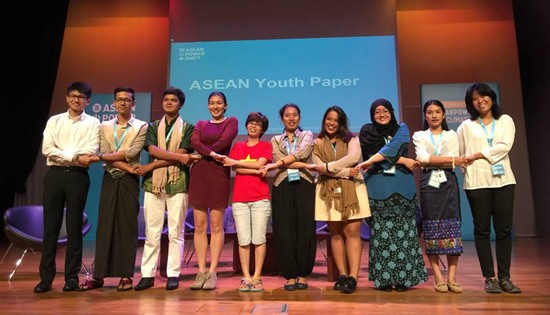|

ASEAN
Powershift 2015 youth heads of delegations from Singapore,
Myanmar, Cambodia, Malaysia, Vietnam, Laos, The Philippines,
Brunei, Indonesia and Thailand. (Photo credit: Dorothy
Ng/350.org Singapore) |
PH youth delegates
make a stand on climate justice
By The Climate Reality
Project Philippines
July 31, 2015
QUEZON CITY – Six
national delegates from the Philippines attended the ASEAN Powershift
Conference held at the University World College of South East Asia in
Singapore from July 24-26. The conference, organized by 350 Singapore,
gathered more than 100 youth delegates from the ASEAN region who
worked together to create a regional policy paper on climate. The
paper will be submitted to the Conference of Parties (COP21) in Paris
this coming December.
“As one of the most
vulnerable regions in the world, it is important to bring
ASEAN-specific issues and corresponding commitments into light,”
Beatrice Tulagan, one of the Philippine delegates, said.
“The Philippine team
reiterated the human rights approach to climate change, emphasizing
quite a number of times that one cannot reduce the most vulnerable
communities to a lazy statistic and there is a moral imperative for
the ASEAN Youth Paper to highlight this unfortunate reality,” Tulagan
added.
The Philippines has always
been at the top of the list of countries most vulnerable to climate
change. The country has experienced climate change impacts such as
extreme weather events, El Niño, warming waters, and rising sea
levels. Haiyan, the strongest typhoon to make landfall in history,
left more than 6,000 people dead and hundreds of thousands without
homes and livelihood.
“After experiencing climate
impacts first hand and working directly with the most vulnerable
communities who have lost homes and livelihoods in the wake of natural
disasters, I look forward to seeing a legally binding treaty come to
be,” Erin Sinogba, also a Philippine delegate, said.
The COP21 which will be held
in Paris this December is expected to come up with a legally binding
treaty among countries to address climate change and its impacts.
Countries are also expected to commit to keeping global warming below
2 degrees celsius relative to pre-industrialization through their
Intended Nationally Determined Contribution (INDC). The INDC reflects
each country’s ambition for reducing carbon emissions, one of the
major causes of climate change.
Among countries in the ASEAN
region, only Singapore has submitted their INDC commitments. The
Philippines, meanwhile, through the Climate Change Commission, has
opened the INDC for consultation until August 10.
“We call on the Philippine
government to urgently prepare an ambitious and a strong INDC and to
legislate and strictly implement laws that will help our country
address climate change, such as RA No. 10174 or People’s Survival
Fund,” said Napoleon Paris, another Philippine delegate.
The role of youth in climate
talks and in pushing countries take climate action was highlighted
during the conference. According to H.E. Dr. AKP Mochtan, Deputy
Secretary General of ASEAN for Community and Corporate Affairs, “the
youth has much at stake, because the youth has much future to live.”
“The youth needs to have a
stronger voice in the climate talks. They will bear the brunt of
climate change impacts which will be felt for years to come. Global
leaders should always remember that what they will decide on in Paris
will be a decision which will impact the lives of young people today
and the future generation,” Rodne Galicha from The Climate Reality
Project and adviser of the youth delegates, said.
"We are running out of time.
If we don't commit to ambitious targets this year, the damage to our
planet will be irreversible. This is a question of social justice as
much as it is a question of our morality," said Renee Karunungan,
Dakila advocacy director who also participated in the conference.
As the rest of the world
waits for global leaders to take climate action, the youth of the
Philippines, together with the youth of other ASEAN countries, are
ready to make a stand and fight for climate justice.
Other Philippine delegates
who were part of the ASEAN Power Shift were Mark Conrad Ravanzo, Jan
Michael Rase, and Alfhonso Jose Platero.